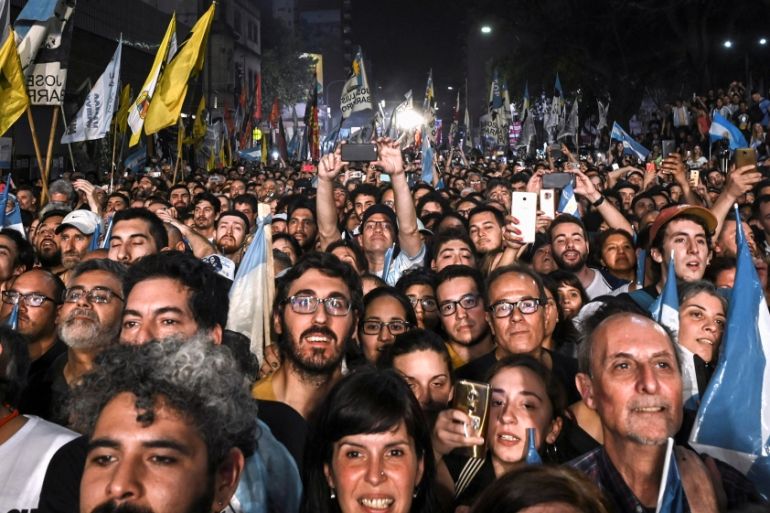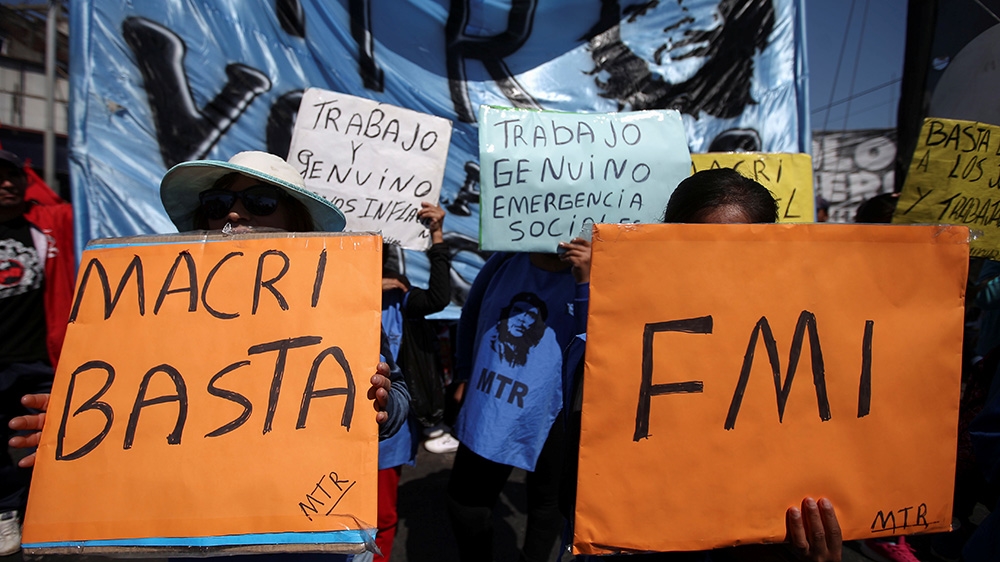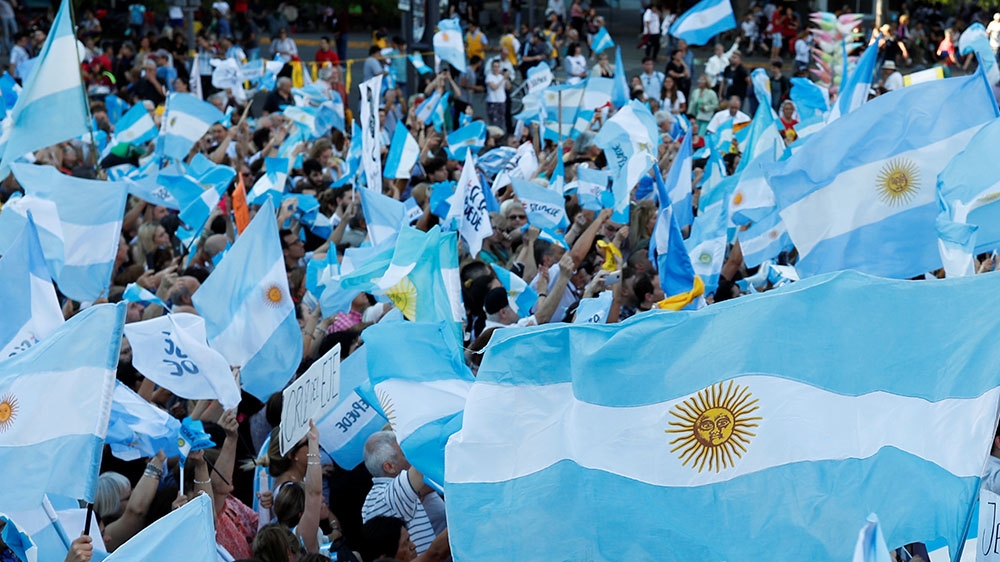Facing economic crisis, Argentina picks Fernandez as president
Left-leaning Fernandez hails government of people, but central bank currency move shows no quick fix to economic woes.

Buenos Aires, Argentina – Argentina on Sunday elected Alberto Fernandez its new president in the hope of a reprieve from the country’s crushing economic crisis, but just hours later the central bank imposed significantly stricter controls on the purchase of US dollars underlining the scale of the economic challenge he faces.
The Peronist ticket of Alberto Fernandez and former populist president Cristina Fernandez de Kirchner won a decisive victory over the incumbent Mauricio Macri, a conservative, in the highly-anticipated poll.
Keep reading
list of 3 itemsArgentina’s IMF bailout rekindles painful memories of past crises
Argentines escape economic pain with film about past crisis
Fernandez’s win unleashed euphoria in parts of Buenos Aires, as supporters cruised the streets honking their car horns, and a wave of people surged towards the neighbourhood of Chacarita, where the official victory party was being held.
|
|
Speaking to supporters at his party’s headquarters, Fernandez thanked voters for showing a commitment to building a more equal Argentina.
“We’re going to be the Argentina that we deserve because it’s not true that we’re condemned to this Argentina,” he said.
“We’re going to enter the world with dignity. The government is back in the hands of the people!”
Macri conceded defeat and invited Fernandez for breakfast to begin the transition process.
“The only thing that matters here is the future and well-being of Argentines,” he told his crowd of supporters, promising a “constructive opposition”.
But after the victory speeches, the central bank revealed that as of Monday, a maximum of $200 a month could be purchased via a bank account, or $100 in cash. That is down from the previously imposed limit of $10,000.
The bank said the measures were an attempt to preserve the country’s reserves, which have been depleting as it shores up the value of the Argentine peso.

The announcement provided stark proof of the challenges facing Fernandez as he sets about trying to steady and revive the third largest economy in Latin America.
With more than 96 percent of polls counted, the lawyer and former cabinet official had 48.03 percent of the vote, ahead of Macri with 40.44 percent.
The difference was narrower than had been predicted in numerous polls, but was above the 45 percent required to declare a winner on the first round.
People sang political songs to celebrate Fernandez’s victory.
|
|
“This is it, we made it,” said a jubilant Matias Palermo, 35, as he walked in Chacarita waving an Argentine flag. “These last few years are like lost years for me. It felt like a nightmare. It changed everything for me, I felt it in my day to day, in my moods.”
Fernandez, who is seen as more of a centre-left moderate than his running mate, was the cabinet chief to deceased president Nestor Kirchner. He served briefly in the government of Fernandez de Kirchner, Nestor’s wife, before the two parted ways in a dispute over farming tariffs.
He maintained a relatively low profile until May, when Fernandez de Kirchner shocked observers who had assumed she would run for president, by instead tapping Fernandez to lead the ticket under the banner Frente de Todos (Front for All).
Fernandez de Kirchner, who is dogged by allegations of corruption, remains a divisive political figure but commands a strong political bloc.

Reality bites
The Fernandez-Fernandez ticket beat Macri by 16 points in the presidential primaries in August, making it seem like an inevitable return to power for Peronismo, a political movement that has come to represent the working class and is named after Juan Domingo Peron, a military leader who ruled in the 40s and 50s, and then again in the 1970s.
Fernandez officially assumes office on December 10.
In the meantime, he will be staring down the grim economic indicators that have been eating away at the third-largest economy in Latin America. Poverty is up 8 points in the last year, at more than 35 percent. Unemployment has grown, thousands of small businesses have shuttered and inflation, a chronic problem in Argentina, is expected to hit 55 percent by the end of the year.
He didn’t see the reality that people were living
Macri, who adopted neoliberal policies throughout his term like cutting subsidies and liberalising the market, was blamed for the deteriorating economic situation. After his striking defeat in the primaries, he focused his campaign on shoring up his base with more right-wing rhetoric.
Fernandez has talked about encouraging small businesses to open by reducing tariffs, about boosting pensions for retirees, and about renegotiating a record $57bn pact with the International Monetary Fund so that it is less onerous on average Argentines.
Analysts agree that Fernandez will not have a lot of room to manoeuvre economically speaking, and he will not be given a lot of time by the electorate that is desperate for things to improve.
Last week, the Central Bank continued to pour hundreds of millions of dollars from its reserves into shoring up the value of the local currency that was weakening as uncertainty loomed over the results of the election. The official peso closed at 65 to the US dollar, and it was trading higher on the black market.

Hope for revival
Fernando Crudo, 80, and his son, also Fernando Crudo, 48, both voted for Fernandez. They have a family business that manufactures laboratory equipment.
“It’s been two years where things have been very, very tight,” said Crudo, the elder, on the steps of his home in Buenos Aires. “Everything is at a standstill. It is very, very obvious.”
“The Peronists have always been about manufacturing and the average worker,” said the younger Crudo, who hopes Fernandez will be able to stimulate consumer spending. “At least this is something different. Let’s hope Alberto can revive things.”
|
|
Voters who supported Macri said while they did not expect to emerge victoriously, they hoped a strong showing would remind the new government that they would be watching.
Voters like Sol Szpryngier, 24, who does not consider herself loyal to any particular party, but supported Macri.
“All things considered, I think his government was transparent. Yes they made mistakes, many mistakes,” she said, but she does not agree with the vision presented by Fernandez and Fernandez, and she worried about corruption taking root in the government.
Sandra Suarez, 58, voted for Macri in the last election but felt deceived by his economic performance, and opted for Fernandez this time.
She said she is not struggling economically, but she fears for her grown children and the uncertainty that has submerged the entire country.
“Everything Macri said he would do, they either didn’t or couldn’t deliver,” said Suarez. “He didn’t see the reality that people were living. There are a lot of people living in extreme poverty.”
